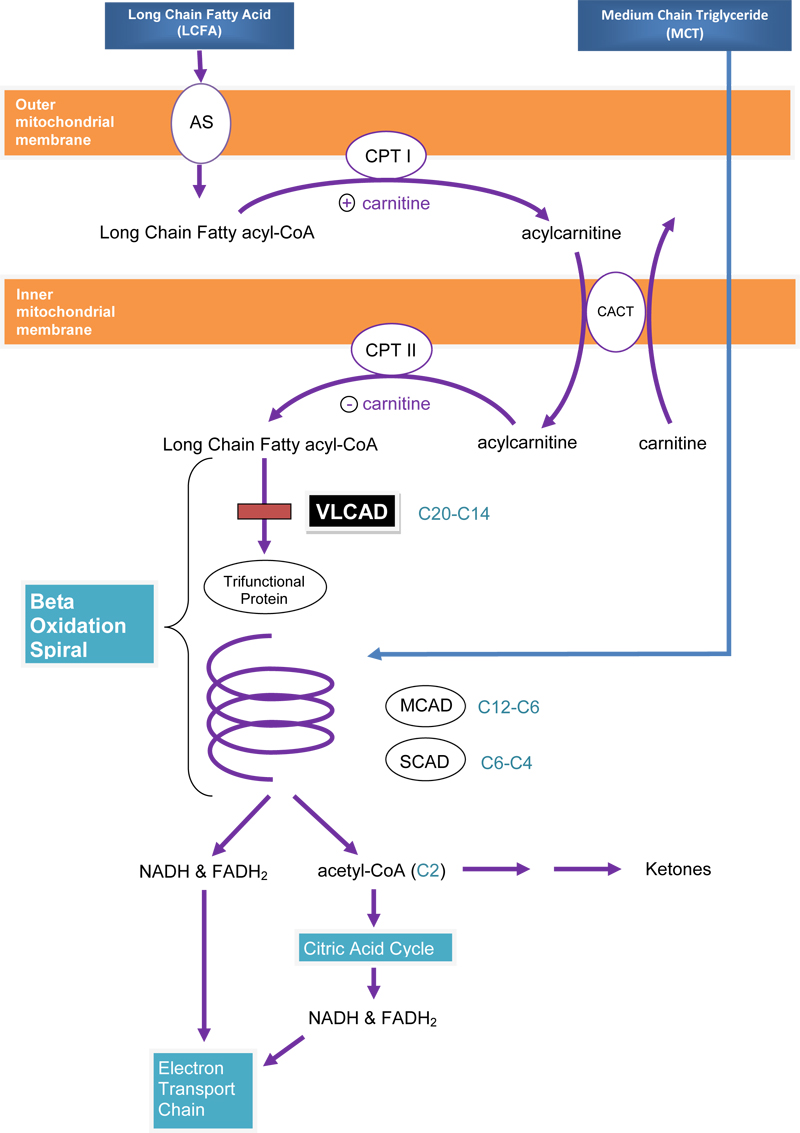February 2019, v.1.4
Updated: November 2022
Feedback/Comments :: View Release Notes
- Overview
- Methodology
- Background
- Biochemical Pathway and Nutrition Treatment Rationale
- Nutrition Assessment
- Comparative Standards
- Nutrition Problem Identification
- Nutrition Intervention
- Nutrition Recommendations
- Monitoring and Evaluation
- Resources
- Benefits and Harms of Implementing the Recommendations
- Barriers to Implementation
- Areas for Future Research
- List of Tables
-
Literature Evidence Summary Tables
- T.1 VLCAD Phenotypes
- T.2 Laboratory and Clinical Findings in Severe VLCAD Deficiency
- T.3 Recommended Intakes of Essential Fatty Acids for Individuals with VLCAD
- T.4 Nutrition Problem Identification for VLCAD
- T.5 Medical Foods for the Nutrition Management of VLCAD
- T.6 Sources of Medium Chain Triglycerides (MCT)
- T.7 Recommendations for Fasting Intervals for Individuals with VLCAD when well
- T.8 Recommended Fat (total, long chain and medium chain), Energy and Protein Intakes for Individuals with VLCAD when Well
- T.9 Essential Fatty Acid Content of Selected Oils
- T.10 Monitoring the Nutritional Management of an Individual with VLCAD when Well
- T.11 Long-chain Fat Restriction and MCT Supplementation Recommendations for Individuals with VLCAD over the age of 1 year
- T.12 Long-chain Fat Restriction and MCT Supplementation Recommendations for Infants with VLCAD
- T.13 MCT Use in Individuals with VLCAD and Cardiomyopathy and/or Rhabdomyolysis
- T.14 European Consensus of Essential Fatty Acid Intakes
- References
- Contributors
- Appendix A: Recommendation Rating Definitions
- Appendix B: Terms
- Disclaimer
Fatty acid molecules are broken down in the mitochondria by β-oxidation. In this process, two carbons are removed at a time, generating a shorter chained fatty acid molecule, acetyl-CoA, NADH and FADH2. Acetyl-CoA then enters the citric acid cycle, while NADH and FADH2 are used in the electron transport chain. The process is repeated on the shortened fatty acid molecule. The VLCAD enzyme catalyzes the initial step of mitochondrial β-oxidation of long-chain fatty acids with a chain length of 14 to 20 carbons.
Figure 2. VLCAD Biochemical Pathway

Fatty acid oxidation requires entry of long chain fatty acids (LCFA) into the mitochondrial matrix via the carnitine cycle enzymes:
- Acyl-CoA synthetase (AS)
- Carnitine palmitoyltransferase I (CPT I)
- Acylcarnitine/carnitine translocase (CACT)
- Carnitine palmitoyltransferase II (CPT II)
Once in the mitochondria, ß-oxidation sequentially oxidizes the long-chain fatty acyl-CoA to the two-carbon acetyl-CoA via these enzymes:
- Long-chain acyl-CoA dehydrogenase (VLCAD)
- Trifunctional Protein which includes enoyl-CoA hydratase, 3-hydroxyacyl-CoA dehydrogenase (LCHAD) and β-ketothiolase
- Medium-chain acyl-CoA dehydrogenase (MCAD)
- Short-chain acyl-CoA dehydrogenase (SCAD)
Acetyl-CoA can then enter the citric acid cycle and or/serve as the precursor for ketone production. The reducing equivalents NADH and FADH2 produced from β-oxidation and the citric acid cycle enter the electron transport chain for ATP production.
In treatment of VLCAD, supplementation with medium chain triglycerides (MCT) bypasses the carnitine cycle and enzymes required to oxidize long chain fatty acids, allowing for continued β-oxidation and production of acetyl-CoA.
Figure adapted from Y.28.
Since individuals with VLCAD deficiency cannot oxidize fat normally due to a deficiency in the enzyme that is involved in the initial step in the beta-oxidation of fats, the rationale for nutrition treatment in VLCAD is to limit reliance on long chain fat as an energy source. Treatment strategies include avoiding fasting, preventing catabolic episodes by providing sufficient energy, especially during illness, and modifying the diet. Depending on the severity of the disorder, diet modifications in VLCAD may include limiting dietary long chain fat and supplementing with MCT. Medium chain triglycerides are oxidized by medium chain acyl-CoA dehydrogenases, thereby bypassing the need for VLCAD enzymes. Carnitine is necessary to transport long chain acylcarntines into the inner mitochondria where beta-oxidation takes place. MCT, on the other hand, are transported directly into the mitochondria and do not require carnitine.


